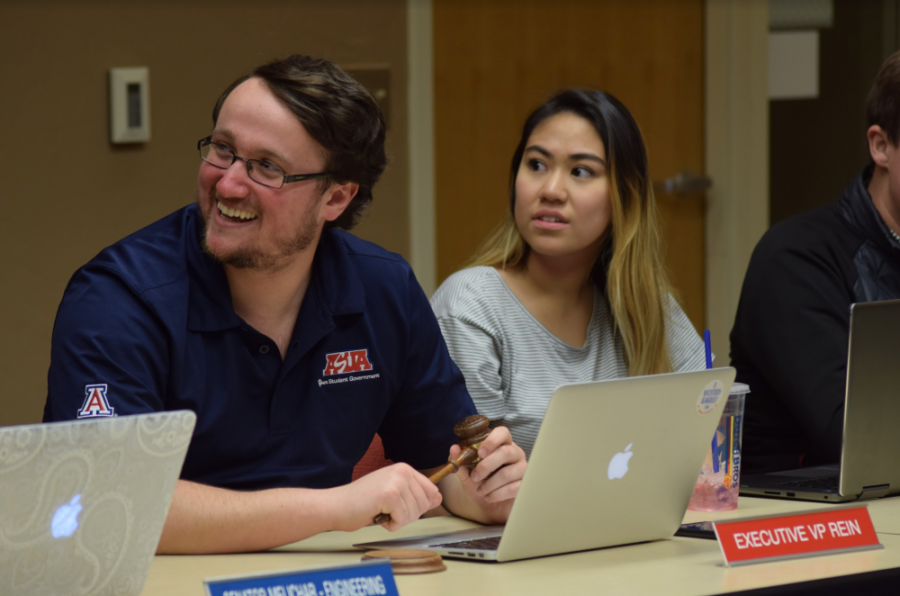The Associated Students of the University of Arizona, UA’s undergraduate governance body, met April 3 to be briefed on the new Honors Village by UA administration and approve a number of funding requests as the semester comes to a close.
Accessibility Concerns for News Honors Village
A number of ASUA senators expressed concerns that the new Honors Village will not be accessible to students from low-income backgrounds.
“The new Honors Village is the most expensive housing option on campus, with a rent of $8,800 and mandatory meal plans starting at $3,400, the cost for students will be between $12,000 and $15,000,” said Sedona Lynch, senator for the Mel and Enid Zuckerman College of Public Health.
RELATED: Senate approves textbook resolution and discusses possible town hall
Ali Santander, assistant director of marketing for Housing and Residential Life, acknowledged the senators concerns that the high price of the new village could be prohibitive for some students.
Santander pointed out the Honors College offered two scholarship packages to help students afford to live in the new village. Honors students can still choose to live in other campus dorms as well, according to Santander.
The new Honors Village will require residents purchase a meal plan that provides them a set number of weekly swipes to gain access to the village’s cafeteria-style food options.
“We want to make sure students are aware of how to make best use of this new style of meal plan on campus,” said Anthony Clarke, an accountant for Arizona Student Unions.
Clarke responded to pushback by senators on this meal plan requirement by pointing out many students who use the service will be receiving an overall discount on food and that waivers are available for Greek Life students.
“If a resident eats every meal at the village, there is a huge discount and the Student Union will lose money. Any profit from the meal plans will go to the giant debt taken to build the new village,” Clarke said.
Tara Singleton, an at-large senator, expressed her concern that honors students not living in the new village will feel excluded from the honors community.
Mike Schilling, the community director for residential education on campus and a higher education graduate student, conceded that the new village creates an honors experience that is not fully inclusive but highlighted the new space will be a hub for events and classes available to all honors students.
“For students who choose to not live in Honors Village, the entire honors experience is still open to them,” Schilling said. “The new village will host honors events that are open to everyone.”
In response to concerns of student safety raised by the Senate, Schilling briefed the senators on plans to add emergency blue lights to the village and its vicinity as well as ensure UAPD are adding the village to their patrol routes.
While Santander confirmed that village construction is on-schedule, she did confess that the number of students planning to live in the dorm is lower than expected.
ASUA President Natalynn Masters criticized UA for not allowing students to apply to live in two lower cost dorms, Graham-Greenlee and Hopi, which are the most affordable options on campus.
“I am concerned that these two dorms, that are more accessible to lower income students, were held in effort to push students into the new Honors Village to reach its occupancy limit,” Masters said.
Santander said that these two dorms were not available because UA’s current enrollment numbers are lower than expected and Housing and Residence Life does not want to place students in dorms which they will not be able to adequately fill.
These two dorms were specifically selected to be held for their proximity to future construction occurring for the Student Success District and not their price for students, according to Santander.
ASUA approves, discussion funding requests
ASUA approved $4,500 for students from the College of Engineering, lead by Senator Madeline Melichar, to construct a mural that would involve over 100 participating students.
The Senate approved the distribution of over $6,500 handed out by its Appropriations Boards for registered clubs on campus. This week’s funding will help UA’s Association for Latino Professional for America travel to a conference and UA’s Women Ultimate Frisbee team compete in San Diego.
The ASUA Appropriations Board has just over $10,000 remaining to support campus club activities.
RELATED: ASUA looks to end semester with number of resolutions
On behalf of SafeRide, a ride service available for free to UA students, Kate Rosenstengel ASUA administrative vice president, introduced a proposal to provide the organization $5,000 in additional funding in order to help purchase SafeRide’s first fully electric vehicle.
SafeRide received a $20,000 grant from UA’s Green Fund to purchase the vehicle, but the organization needs $10,000 in additional funding to make their proposal a reality.
The ASUA Senate will vote next week on the request.
Check back to the Daily Wildcat next week for more coverage of ASUA.
Follow Randall Eck on Twitter









